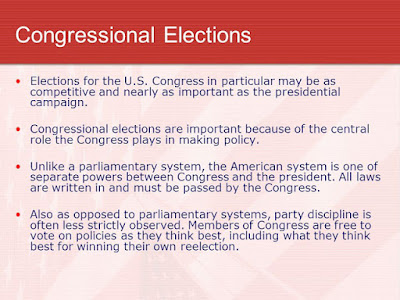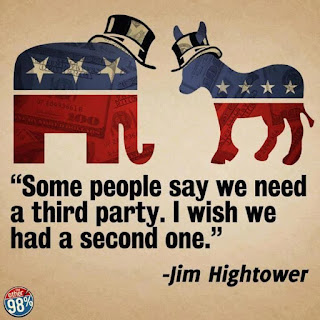They may be volatile, arrogant, domineering, but, with integral management political parties could neutralize those unsavory elements of behavior to abide by The Constitution as established in "We The People" is primacy of authority over business affairs and both defines and limits that power.
But some other behaviors and characteristics can be seriously damaging as well if someone displays a toxic combination of these traits: he can undermine his colleagues in a lasting way, and he can potentially poison and destroy an entire team.
Psychologists have identified three traits that make up the sinister sounding "Dark Triad": narcissism, Machiavellianism and psychopathy.
In this session we will explore the three elements of the Dark Triad, identify the behaviors associated with each of them, and look at how they might impact the Democratic Process.
The Dark Triad is a phrase you're unlikely to have heard, but it is one of the "buzzwords" in the world of psychology.
- Narcissism: narcissism comes from the Greek myth of Narcissus, a hunter who fell in love with his own reflection in a pool of water, and drowned. Narcissistic people can be selfish, boastful, arrogant, lacking in empathy, and hypersensitive to criticism.
- Machiavellianism: the word comes from the renowned 16th century Italian politician and diplomat Niccolo Machiavelli. He earned notoriety when his 1513 book, "The Prince," was interpreted as an endorsement of the dark arts of cunning and deceit in diplomacy. Traits associated with Machiavellianism include duplicity, manipulation, self-interest, and a lack of both emotion and morality.
- Psychopathy: personality traits associated with psychopathy include a lack of empathy or remorse, antisocial behavior, and being manipulative and volatile. It's important to note that there is a distinction between psychopathic traits and being a psychopath, with its commonly held association with criminal violence.
Traditionally, psychologists have identified Dark Triad traits by measuring different personality types separately.
However, in 2010, Dr Peter Jonason, then assistant professor of psychology at the University of Western Florida, and his co-author, Gregory Webster, assistant professor of psychology at the University of Florida, developed the "Dirty Dozen" rating scale, or a 12-item methodology, to measure Dark Triad traits.
Jonason and Webster's measure asks people to rate themselves against these questions:
- I tend to manipulate others to get my way.
- I have used deceit or lied to get my way.
- I have used flattery to get my way.
- I tend to exploit others towards my own end.
- I tend to lack remorse.
- I tend to not be too concerned with morality or the morality of my actions.
- I tend to be callous or insensitive.
- I tend to be cynical.
- I tend to want others to admire me.
- I tend to want others to pay attention to me.
- I tend to seek prestige or status.
- I tend to expect special favors from others.
At its basic level, an individual would be rated from, for
example, one to seven on each of the 12 tests, giving a possible score of 12 to
84. The higher the score, the higher the probability of having Dark Triad
tendencies.
It's difficult to find anything positive to say about the
impact Dark Triad traits would have in the political workplace arena. Someone
with such a psychological make-up would probably display an undesirable
behavior, such as being aggressive, volatile, selfish, and deceitful, or a
combination of such traits.
In his 2013 paper, The Dark Side of Personality at
Work, Dr. Seth Spain, assistant professor at Binghampton University School of
Management in New York, said there was evidence of a "fairly robust
relationship between Machiavellianism and unethical decision-making in organizations."
Manipulative people often good at hiding their behavior or
actions, but there are signs voters can look out for, such as someone who won't
take no for an answer, who always excuses their hurtful behavior, or presents a
different "face" to different people to serve there purpose or purposes.
So when concerned voters challenge a suspected manipulative
incumbent or candidate, “We The People” must be specific about what actions have
been spotted, how they are harming team America and Make crystal clear that their
behavior(S) must change, they will be held accountable, and when appropriate common
correlations between them promoting dishonesty and a lack of humility behaviors
will evolve disciplinary certainties that include removals of varied people plus selves from the political
arena(S).
Clearly, these traits put the desires of "dark side" individuals above the needs of America, the people within it, and those it serves, and this can destroy good democracy, particularly when that person is in and represents varied leadership roles.
Clearly, these traits put the desires of "dark side" individuals above the needs of America, the people within it, and those it serves, and this can destroy good democracy, particularly when that person is in and represents varied leadership roles.
Too much work involved one may say?
Which would be less laborsome in any long term sense: stick with the status quo in blind faith or apply beforehand those necessary integral ounces of prevention that realistically Proviso pounds of ethical cures?
OR


















It's difficult to find anything positive to say about the impact "Dark Triad" traits have in political workplace arena other than they do not compliment whatever could have made American democracy Great again.
ReplyDelete